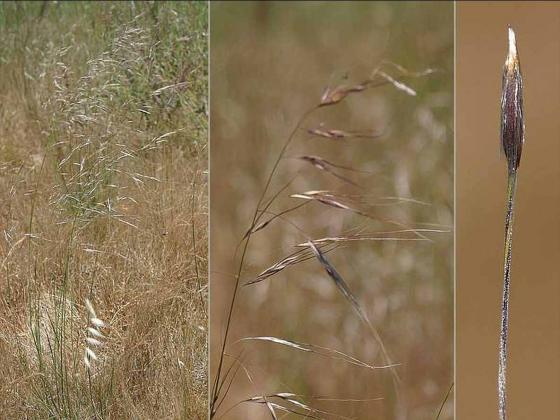
Fine-head Spear-grass
Austrostipa oligostachya
Tufted grass with flower stems to 1 m tall. Stem joints (nodes) are hairy. Leaf-sheaths purplish. Leaves erect, to 20 cm long, with tightly inrolled margins. Seeds are green, drying to deep brown and covered with white or golden hairs on the lower half.
| Details | |
|---|---|
| Flora Type | Grasses |
| Former Scientific Name | Stipa oligostachya |
| Distinctive Features | Curved sickle-shaped bristle or awn up to 70 mm long, twice kinked. |
| Biology | Perennial. Highly drought-tolerant. Basalt-derived soils but also in gold country on sandstone soils. Preferential grazing of other grasses can lead to flowering and seeding of Spear-grass and their long awns (bristles) can work their way into the skin, mouths and eyes of stock, and contaminate wool. |
| Native Status | Native |
| Flowering Time | Sep-Dec |
| Taxonomy | |
|---|---|
| Phylum | Tracheophyta (Vascular Plants) |
| Class | Magnoliopsida (Flowering Plants) |
| Order | Poales |
| Family | Poaceae |
| Genus | Austrostipa |
| Species | oligostachya |
Seed coloration and hairiness as well as the awns (bristles on seeds) are important identification features for Spear-grass species. A food source for seed-eating birds including finches. Also attracts moths and butterflies.
| Interesting Facts | |
|---|---|
| Similar Species | Similar to A. bigeniculata. Where they occur together may hybridise. |
| Native Status | Native |